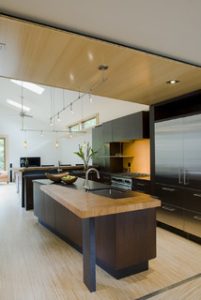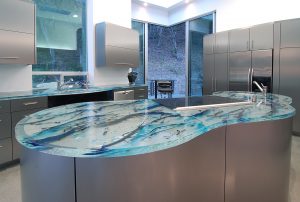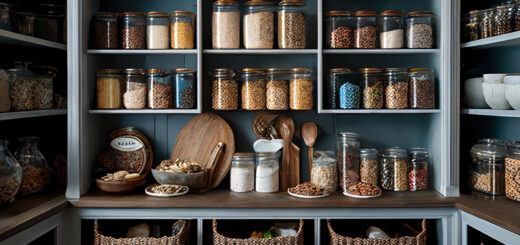Recycled Countertops
GLASS
Glass is a sustainable, infinitely recyclable material which saves precious natural resources. It is virtually maintenance free and can endure high heat without cracking or scorching. The combinations of shapes, colors and artistic embellishments are almost limitless as shown in the pieces from Thinkglass. (pictured above)
SALVAGED WOOD
A wood countertop will add richness to your kitchen from the wood’s history. Look for wood that has a story — maybe it’s salvaged from some iconographic building or even from the project’s remodel. An island is a better option for wood as it is more susceptible to damage by water and heat, so it’s best located away from the sink, dishwasher, and range.
BAMBOO
 Bamboo’s best green feature is that it’s a rapidly renewable resource and is naturally stronger and harder than most other hardwoods. When managed responsibly, it is a fast, sustainable source of raw material for a wide variety of uses. Be aware, though, that almost all commercial bamboo comes from China, so a lot of energy goes into transporting the product to the United States.
Bamboo’s best green feature is that it’s a rapidly renewable resource and is naturally stronger and harder than most other hardwoods. When managed responsibly, it is a fast, sustainable source of raw material for a wide variety of uses. Be aware, though, that almost all commercial bamboo comes from China, so a lot of energy goes into transporting the product to the United States.
RECYCLED PAPER
Paper countertops? Regardless of preconceptions, recycled paper countertops are pretty tough and durable. Their dense and non-porous construction make them highly resistant to stains and nicks and are easier to maintain. Since paper is far lighter than natural stone materials, recycled paper countertops can come in longer spans without requiring additional support.
STAINLESS STEEL
Not only are steel counters aesthetically pleasing but they’re resistant to water, heat, stains, and just about anything else. Stainless steel has a non-porous surface, which means that no type of liquid or substances can penetrate into the material at all. This surface has top-notch durability that stands up to even commercial kitchens and their rigorous standards for cleanliness.
CONCRETE
Concrete counters can be a terrific green choice if they are sourced locally or cast in place (transporting heavy slabs great distances can be expensive and timely). A big pro of concrete countertops is that they are easy to maintain and keep clean, a simple solution of soap and water is all you need. Cement will not decay overtime and will retain its integrity.
SALVAGED WOOD
You’ll feel good about your selection and add personality and richness from the wood’s history. I look for wood that has a story — maybe it’s salvaged from some iconographic building or even from the project’s remodel. Just remember, wood is more susceptible to damage by water and heat, so it’s best located away from the sink, dishwasher and range. An island is a good option.
ICE STONE
Recycled glass countertops vary greatly in appearance. IceStone, which is Cradle to Cradle certified, provides an opaque, refined character with its fine glass particles set in pigmented cement. Because the material is porous, recommendations call for sealing twice a year, so make sure you’re up for the maintenance.
STAINLESS STEEL
Stainless steel is made of 60 percent recycled content and, because it can be recycled again and again, has an extended useful life. This product offers top-notch durability that stands up to even commercial kitchens and their rigorous standards for cleanliness. Perfectionists take note: Keeping stainless steel free of smudges and watermarks can be a chore.









